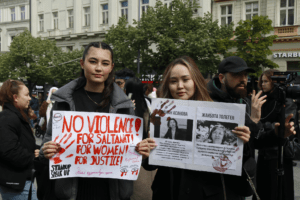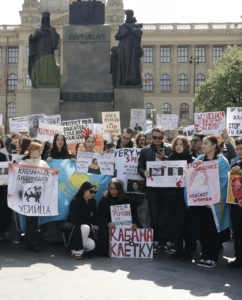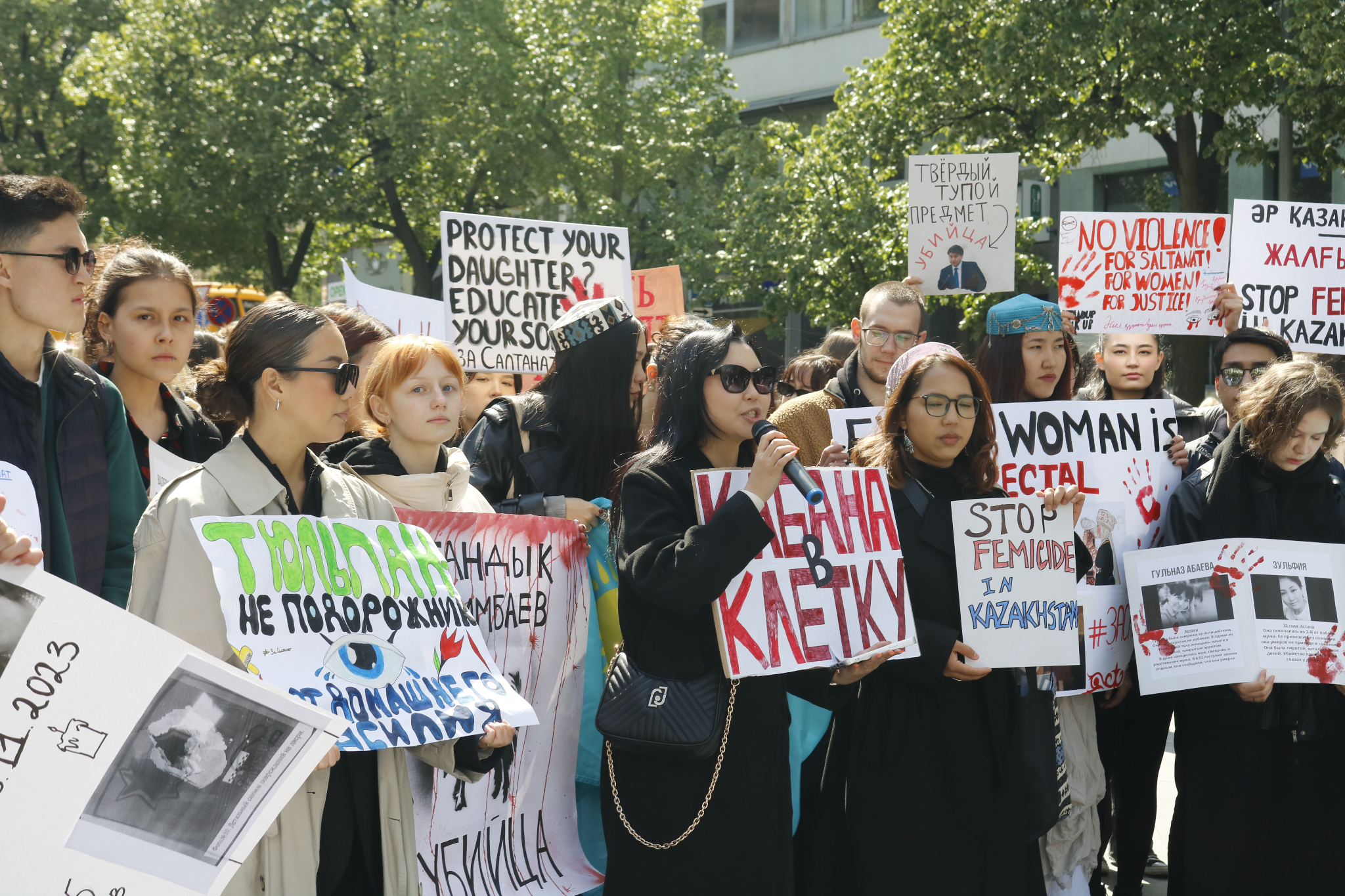On Sunday, 21 April in the center of Prague on Wenceslas Square, some 200 people attended a rally in memory of Saltanat Nukenova and in protest against violence against women.
The event took place against the backdrop of the trial of former Kazakh minister, Kuandyk Bishimbayev, who is accused of torturing and murdering Saltanat Nukenova, with whom he was bound in a common-law marriage.
In an interview with The Times of Central Asia, Aruzhan, one of the organizers, described the various problems encountered by the team, beginning with the hostile criticism expressed by many young hecklers with little or no knowledge of the situation.
“We were bombarded with comments like, ‘Kazakhstan has enough problems;’ ‘Why didn’t you come out for the floods?’, ‘Only one person died,’ and so on. It was both frustrating and unpleasant to see that side of our young people but I think, and hope, that the rally woke some of them up and changed their minds.There were also those in Saltanat Ushin’s group who twice expressed their ‘valuable opinion’ and provoked quarrels between the participants.”

Image: Asel Kamiyeva
Despite a statement issued by the Foreign Ministry of Kazakhstan that it was happy for its youth to speak out, there was a marked absence of support from the embassy. Aruzhan said it was disappointing, but nowhere near as bad as what happened in Tbilisi, where during a similar rally the Kazakh embassy had openly threatened and called in the organizers.
Aruzhan explained that officials had accused the organizers of acting in defiance of the embassy, and, whilst logging their details, told them they should be ashamed and focus instead on other problems. She said that they been repeatedly told, “the law’s already been passed, so calm down.”
“In every city where a rally was held, the embassy behaved in this way, even after the Ministry of Foreign Affairs issued a statement claiming they supported our action and were happy for us to express our position.”
Aruzhan described an incident which illustrated that a close eye was being kept on proceedings: “Before the rally, a large car arrived on site. Intimidating-looking men leapt out, made a quick assessment of the number of people gathered, and drove off. They spoke in Russian and Kazakh.”

Image: Asel Kamiyeva
Another challenge facing the organizers, was the lack of media support.
“The groups to which I made initial announcements about the rally deleted my posts, explaining that they had ‘cultural content that does not concern politics’. It was funny and sad to read this; funny that we are perceived not to touch politics, and sad that they are so shaken by it. In Istanbul, the embassy scared people so much that they gave up the idea of going to the rally. At our rally, we shot reportage that came out more like a social video. Not a single media outlet picked it up. I think that says a lot about how censorship works. So we turned to bloggers, Russian-speaking media in the Czech Republic, thanks to whom we reached 147,000 views.”
Despite all, the rally proceeded peacefully, and praising the organizers for doing a great job, a participant named Saida told The Times of Central Asia: “The girls were insanely cool in coping with such a huge crowd. Over a hundred people joined in and took pictures. People from Ukraine and Belarus came up to us asking what was going on, and many also brought placards, gave interviews, and joined in the shouting. People from Mongolia, Kyrgyzstan and Siberia also participated in the demonstration, but what pleased me most was that there were men brandishing signs declaring ‘Men should protect women, not kill them’. It was nice to see that they, too, are aware of the problem of unpunished violence and harassment in our country.”
Saida said that, appalled by the recent atrocity in her homeland, she joined the rally to personally express her position in the fight for women’s rights around the world.
“This is not the first year that I have fought for women’s rights in general, but here in my country, there was a demonstrative event where everything became obvious to everyone. I know that in the Czech Republic, the law is on the side of the people and our rally, because it was peaceful, and was not suppressed. I felt safe and free to express my civic position, but noticed that there were those who despite living in the Czech Republic, did not want to show up for fear of returning home (to Kazakhstan) or getting banned/questioned etc. It was also important for me to offer support and gratitude to Saltanat’s family and all those who are now fighting in court for her rights. I have therefore actively disseminated information about the rally on social networks to help it being more widely seen and heard.”
The trial of Kuandyk Bishimbayev, the former Minister of the National Economy during the reign of former-President Nazarbayev has been streamed live, and has gripped the country. On April 24, Bishimbayev admitted to causing Nukenova’s “death through negligence.” On April 15, President Tokayev signed into law landmark new legislation on domestic violence which the United Nations Development Programme (UNDP) in Kazakhstan labelled a “crucial step towards equality, justice [and] safety for all citizens” that “lays a foundation for a stable, prosperous society.”



